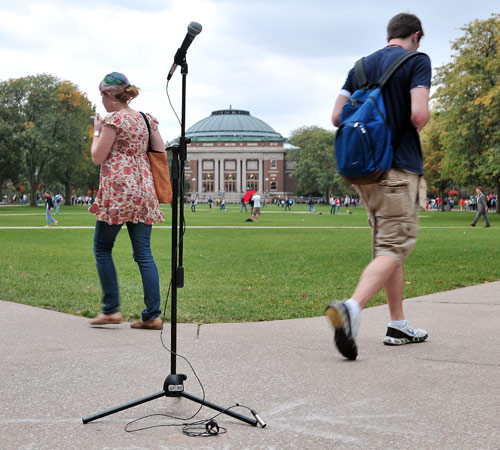UI neglected along presidential campaign

Erica Magda
Oct 17, 2008
Last updated on May 13, 2016 at 03:36 p.m.
For Greg Pillon, Christmas came in October.
“It has been such an emotional day,” said Pillon, the communications director for Belmont University in Nashville. “It’s like Christmas morning.”
However, Barack Obama’s largest home state-run university, the University of Illinois, is missing from the list of college campuses hosting debates this season. Neither Republican nor Democratic presidential candidates have visited the University after accepting their party’s nomination, and University students might be missing out on a politically energizing experience.
On Oct. 7, Belmont University hosted the second debate of the 2008 presidential election featuring presidential candidates Barack Obama and John McCain. These debates have been held on college campuses around the country, namely the University of Mississippi, Washington University in St. Louis and Belmont University.
Get The Daily Illini in your inbox!
The third and final presidential debate took place Wednesday night at Hofstra University in Hempstead, N.Y.
“I haven’t heard of anyone doing something like that (here),” said Robin Kaler, Associate Chancellor for Public Affairs at the University. She added the last time the University hosted a presidential visit was when Bill Clinton was in office.
Kaler said getting the school ready for a presidential debate would be a great deal of work with no long-term benefits.
Though this may be true for the University of Illinois, hosting a presidential debate could not have been a better choice for Belmont University, said Dan McAlexander, Belmont University provost.
“The impact on campus is pervasive,” McAlexander said. “You’re right where history is, right where history is happening.”
To inform students before and after hosting the presidential debate, Belmont University created a student engagement program called “The Art of Being Free.” The program brings in guest political lecturers to speak on issues ranging from the environment and sustainability to faith in politics, McAlexander said.
“It’s a year long of activities helping students (understand) what it means to be an American citizen,” he said. “I’ve never seen a college student population as energetically engaged in an election since I was in college during the Vietnam War.”
McAlexander also mentioned the boost in advertising value Belmont had received through hosting the debate. By 8:10 a.m. the morning after the debate, 1,366 stories had been written with mention of Belmont University around the nation – all this in less than 12 hours, he said.
“For us, that was $11.5 million of publicity value,” McAlexander said, adding that the publicity would make it easier for Belmont to recruit students in the future.
Alex Beata, senior in LAS, said he thought hosting a presidential debate would encourage greater public debate at the University as well as bolster the local economy. However, he said he did not think the University needed the extra name recognition.
“I think we’re fine,” Beata said. “For something that happens every four years, it’s not going to make much of a difference.”
Washington University, which hosted the only vice presidential debate of the election season, also had its share of pre- and post-debate programs for students.
According to Washington University’s debate Web site, events had been planned from the end of August through November, past the presidential election.
Plans include voter registration drives, satirical political performances, guests speaking on the responsibility of elected officials and discussions of the role of the president over coffee to name a few.
“Students get really involved in the debate,” said Randall Calvert, professor of political science and public affairs at Washington University. “We get a high level of focus and expertise of the political campaigns on campus.”
Brittany Perez, senior and executive president of Washington University’s Student Union, said she thought every student had done something to get involved with the election and debate.
“This election season has gotten everybody interested,” Perez said. “People are pretty passionate about what will happen Nov. 4.”
Perez said the student government even set aside funds for student political programming.
About 500 to 600 students applied to be volunteers for the debate, she said, adding that some students woke up at 5 a.m. to see live news broadcasts from their school.
“We had a lot of news celebrities at our fingertips,” Perez said.
McAlexander said students at Belmont were equally affected.
“This is something our students will always remember,” he said. “It’s an amazing thing. It makes you think again of how great this country is.”
However, great experiences come at a price.
With 3,000 journalists, 800 news stations, 60 miles of cable and only 300 student volunteers, “everybody is celebrating left and right and ready to fall over dead,” McAlexander said. “All offices have been working 16- to 18-hour days for a week.”
Steve Givens, associate vice chancellor for public affairs and executive director of university communication for Washington University, also mentioned the extreme dedication necessary for hosting a presidential debate.
“So much goes into it,” Givens said. “We are required to provide a venue for the debate and thousands of members of the media. It’s not like hosting a football game.”
Yet, students in Champaign-Urbana do not have to wait for a life-changing political debate to come to town to get politically involved.
According to the University’s Registered Student Organization Web site, there are at least 20 politically-themed organizations students can participate in, such as Politics without Partisanship, College Democrats, Campus Greens and New Federalists.





